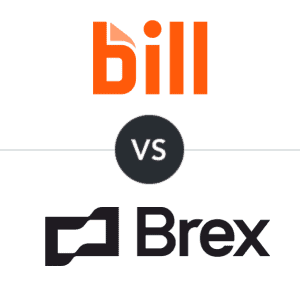Corporate cards can be a great choice for certain businesses, offering good benefits and flexible spending, but there are definite pros and cons to these credit cards.
A corporate credit card can be a must-have tool for big organizations. But can a small business benefit from using a corporate card, too? And what exactly is a corporate credit card, anyway? How do corporate cards differ from business credit cards, and which should you use?
If you find yourself playing a mental game of 20 questions wondering about corporate credit cards and how they work, we’re here to help. We’ll demystify the increasingly popular corporate credit card so that you can know if a corporate credit card is the right choice for your business. Spoiler alert: not every business will benefit from, or even qualify for, a corporate credit card.
Stay tuned to learn exactly what a corporate card is and if your business needs one.
What Is A Corporate Credit Card?
Disclosure: This video is sponsored by BILL and is included for informational purposes.
A corporate card is a type of credit card that is designed for corporations to manage employee spending. Corporate cards are structured in such a way that the business itself, not the business owner, is liable for all card purchases. This gives some much-needed liability protection to business owners. The tradeoff is that since card issuers still need a way to make sure issuing you a credit card is secure, you generally have to meet stricter eligibility requirements to qualify for a corporate card: that means high annual revenue, large cash reserves, or even sizable equity investment.
The good news is that if you do qualify for a corporate credit card, not only do you get business protection, but you’ll also find a slew of business-specific perks like rewards earnings on popular business categories, partner discounts on popular business software, accounting integrations, and more.
Pros
- Streamline your company’s business and travel expenses
- Protect your personal assets
- No personal guarantee required
- Track and control employee spending
- Unlock business-specific rewards and perks
Cons
- Businesses must generally be well-established or well-funded
- Eligibility requirements extend beyond personal credit
- Need to demonstrate good corporate accounting practices
- Must be able to repay the balance each month
How Does A Corporate Card Work?
Corporate cards operate similarly to charge cards in that you have to repay the card regularly and generally cannot carry a monthly balance. However, a few fintech companies are disrupting the traditional credit card scene by offering more flexible repayment terms (generally 30-90-day repayment terms). however, to qualify for these terms, you’ll likely need to meet even stricter eligibility requirements than those already present with corporate cards.
This means that there’s generally no APR, as you’ll be expected to make daily, weekly, or monthly repayments depending on the card issuer.
Many businesses give employees their own corporate cards. Employees can then use their corporate card to make business purchases, and employers get the twofold benefit of:
- Racking up rewards from all of the employee spending
- Tracking and controlling employee spending
The second element is what makes corporate cards such a great asset for large businesses. You can monitor and control employee spending with corporate card-specific features like spending limits, eliminating reimbursement processes, and more.
Corporate cards can be issued by most traditional banks, but there’s also a growing number of fintech companies that offer corporate cards. These companies generally have more competitive rewards and features to incentivize businesses to choose their companies over more traditional banks. Our list of the best corporate credit cards — both traditional banks and fintechs — are secure and worth looking into.
Types Of Corporate Credit Cards
A trickier aspect of corporate credit cards is the various ways corporate cards can be structured. Depending on the liability structure of the corporate card, either the employer or the employee (or a combination of both) is held responsible for repaying the credit card bill.
It’s important to know how this liability breaks down so that business owners can create effective policies and business employees can keep themselves informed and prepared before making any purchases on a corporate credit card.
Here are the three types of corporate credit cards:
- Corporate Liability: The company is solely responsible for all debts incurred. The company receives the bill directly from the card issuer. The issuer will not check your employees’ credit.
- Individual Liability: The employee using the corporate card is responsible for the debt incurred on the employee’s corporate card. The employee must pay the bill and then request reimbursement from the company. This arrangement requires that the issuer run a “soft pull” of the employee’s credit so that the employee’s credit score won’t take a hit.
- Joint Liability: Both the company and the employee are responsible for the debt. Under this arrangement, an employee’s personal credit will be unaffected if their corporate card is paid in full within a set number of days. However, if a payment is missed or late, the issuer reports the delinquency to the credit bureaus, and the employee’s personal credit score is affected.
Individual and joint liability programs pass more of the credit risk on to the employee, while corporate liability insulates employees from this type of risk. In some cases, you may be able to choose which type of liability your corporate card program follows. Be sure to talk to your corporate card issuer to know exactly what to expect.
How Is A Corporate Card Different From A Credit Card?
|
Small Business Credit Card |
Corporate Card |
| Who Can Apply |
All business types |
Generally limited to corporations (currently only one issuer supports sole proprietors) |
| Personal Guarantee |
|
|
| Carry A Balance |
|
|
| Cash-On-Hand Requirements |
|
|
| Credit Check |
|
|
| Employee Cards |
10-15 |
Unlimited |
| Expense Management |
|
|
| Rewards |
|
|
| APR |
Varies |
N/A |
While corporate cards and business credit cards function similarly in terms of making purchases, a few key differences emerge. The table below highlights the most common differences, though there are some exceptions.
A corporate credit card is similar to major business credit cards, at least on the surface. Both can be used to make business purchases and earn rewards. The main differences are that:
- Corpaote cards operate like charge cards and aren’t designed for carrying a balance
- Corporate cards are approved based on the business’s security, rather than the business owner’s credit and provide added liability protection
- Corporate cards often come with added tools for tracking spending, free cards for employees, and useful integrations to business software you may already be using
- Business credit cards are generally easier to qualify for (though your personal credit will be taken into consideration, and you may have to sign a personal guarantee)
Learn more about the difference between credit cards vs corporate cards to see which is better for your small business.
The Benefits Of Using A Corporate Credit Card
Corporate credit cards offer qualifying businesses a large number of benefits including:
- Personal liability protection
- Rewards on business spending & purchases
- Discounts on business software, travel, & other purchases
- Strong employee tracking & spend controls
- Time saved on purchase approvals and reimbursement processes
- Expense reporting
- Strong record keeping
- Accounting integrations
Are Corporate Cards Hard To Qualify For?
Corporate cards are generally more difficult to qualify for than traditional business credit cards because they require an established business revenue and history in order to qualify. On some cards, annual revenue requirements are $1M or more. This is because card issuers need a way of verifying that your business is secure and profitable since the business holds all of the liability, not the business owner.
However, if you have poor personal credit, a corporate card may be easier for your business to qualify for than traditional business credit cards.
It’s also worth noting that certain fintech companies are making corporate cards easier for smaller businesses to qualify for.
In the past, not only did you have to have large revenue requirements and cash on hand to qualify for a corporate card, you also had to have an LLC or corporation business structure. While many card issuers still have this requirement, BILL Spend & Expense is open to sole proprietors and has a much, much lower cash reserves requirement than other corporate card issuers.
Similarly, Brex is making corporate cards attainable for startups in a way that hasn’t been seen before. If you’re just starting out and don’t have an established credit history or revenue yet, but you do have significant equity investment, you could still qualify for a corporate credit card.
So, if you’re a small business, BILL Spend & Expense is definitely worth looking into before ruling out corporate cards and going straight to the best business credit cards. If you’re a startup, Brex could be a good option.
The Bottom Line: Should You Get A Corporate Credit Card?
Corporate credit cards are getting a lot of positive press these days. Relative newcomers like BILL Spend & Expense, Ramp, Brex, and Rho continue to shake up the world of business spending, to cardholders’ benefit. There are clear advantages to these card offerings, but is a corporate card right for your business?
Choose A Corporate Card If…
- You have more than ten employees who regularly spend company money on legitimate business expenses
- You can meet common corporate card requirements like minimum cash on hand or number of employees
- You don’t want to undergo a personal credit check or offer a personal guarantee
- You are comfortable paying off your balance in full as required with daily, weekly, or monthly repayments (that usually come directly out of your bank account)
- Your business can benefit from special travel perks and partner offers for software and services
- Your accounting team would appreciate time-saving perks like spend controls, automatic expense coding, and digital receipts
If you’ve decided that a corporate card is the right approach for your business, check out the best corporate credit cards for businesses. If you have a card in mind already, we have a guide on how to apply for a corporate credit card, plus other resources like how to create an effective corporate card policy and more.













